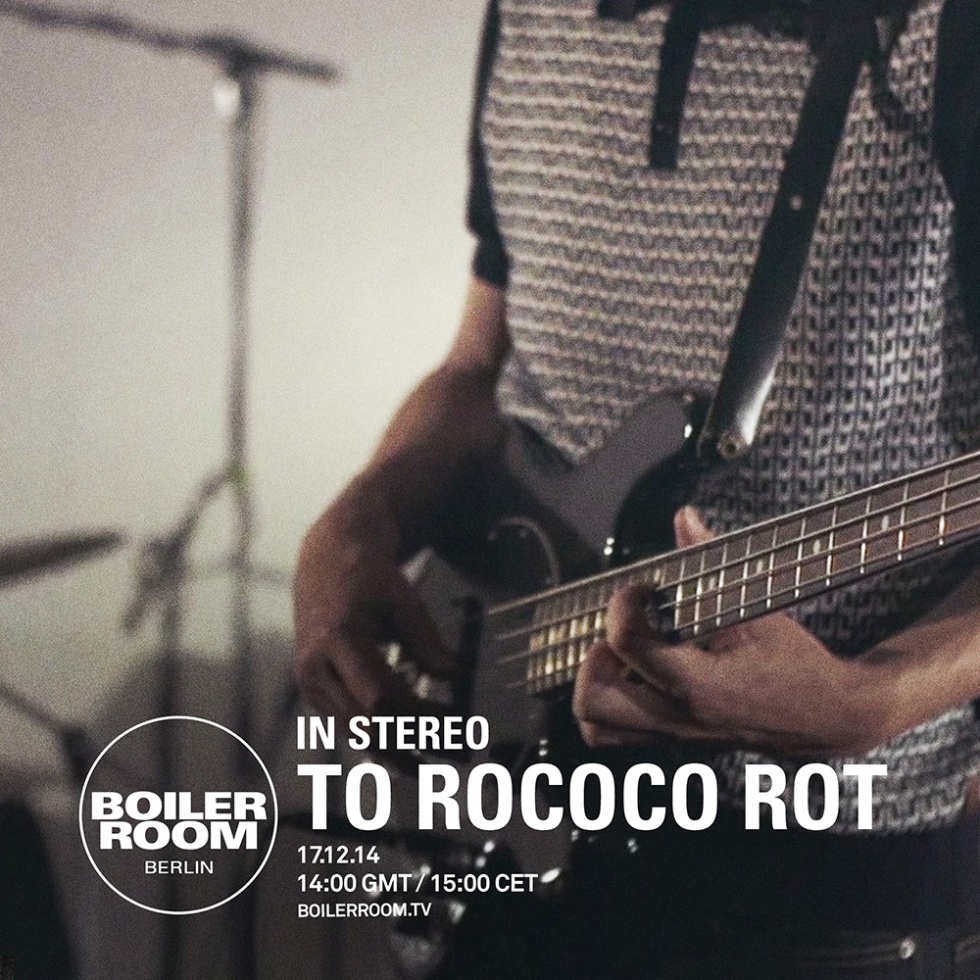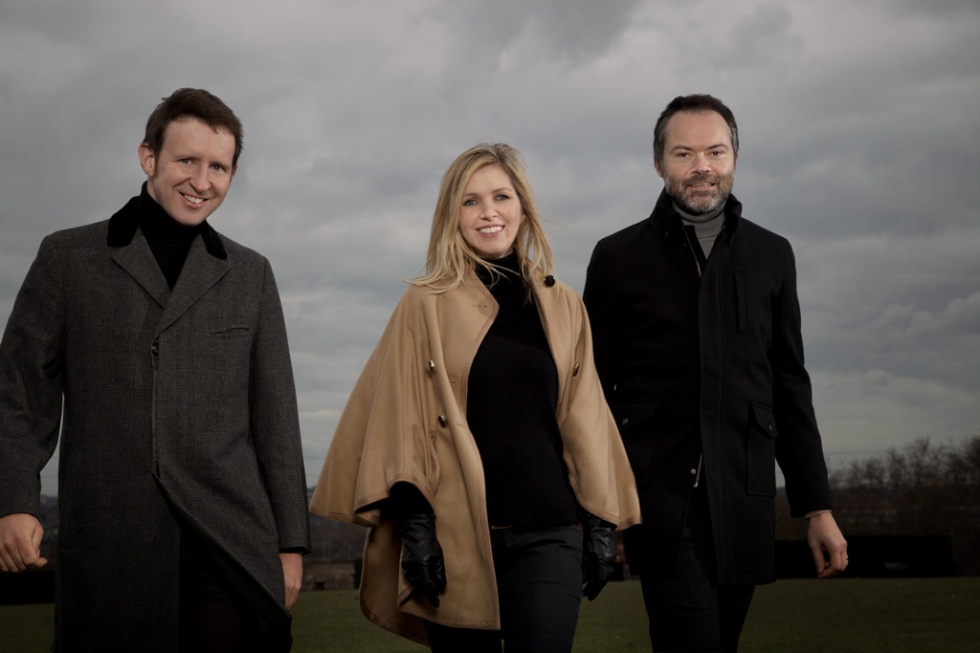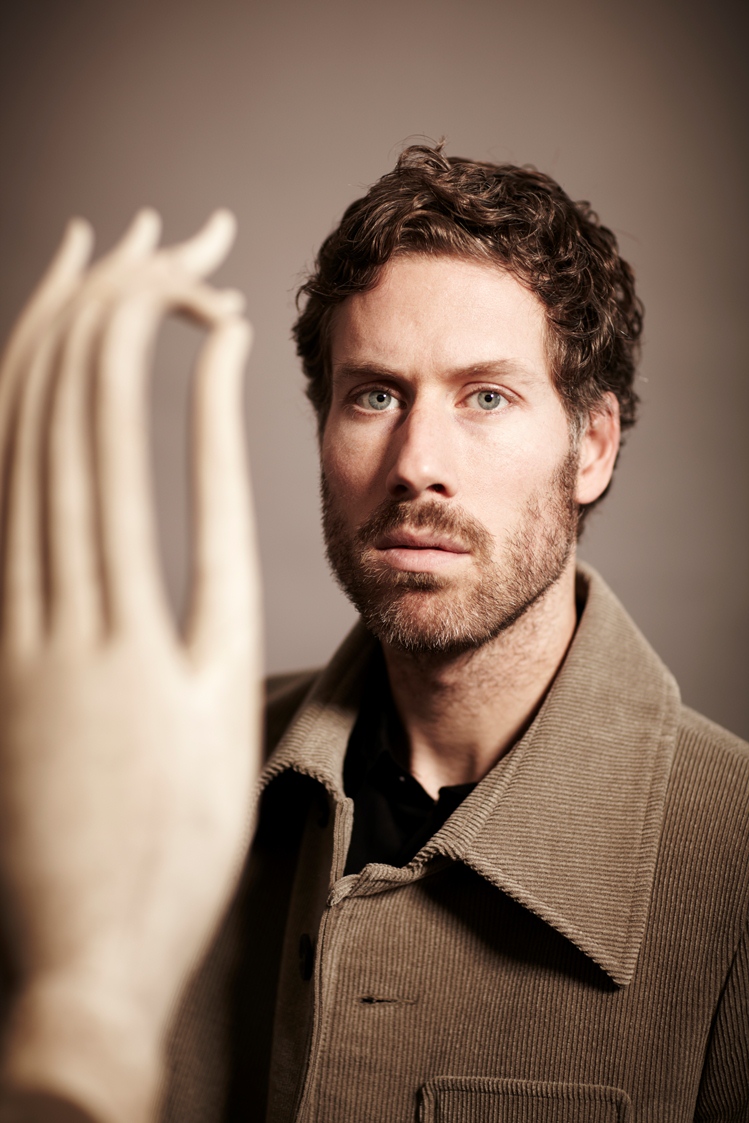
In the late 1990s, the term “post-rock” started getting thrown around, and all too often it meant something very serious indeed with lots of noise, abstractions and repetitions – definitely something for the beard-strokers. But among all of this, one of the bands that attracted that tag stood out as being all about the pleasure principle. The trio of Stefan Schneider with brothers Ronald and Robert Lippok were all wildly talented and remain to this day voracious collaborators with huge discographies; but together they hit on a specials magic: quite simply, they made very beautiful records.
To Rococo Rot certainly had a seriousness about them, like many from the arty, collectivist Berlin scene they emerged from, and they could get intense with the best of them too. But from their formation they had a unique way with melody, a wry humour, and a lyricism and sweetness to their playing that hooked listeners in an altogether different way. As well as connecting with electronica and post-rock musicians in the German scene they made friends and fans more broadly, including, tellingly with masters of wistful and dreamy songwriting, Saint Etienne.
Over 18 years, TRR have been a quiet dynamo for underground music, their influence and sound rippling through and energising those around them without ever having to be part of the standard hype mechanisms. As we’ll see in the testimonials below from some of their collaborators and admirers (as well as TTR’s Robert Lippok himself), they began quickly and without fuss, and they are ending just as unceremoniously. They have agreed among themselves that it isn’t working any more, and are stopping. So it’s a bittersweet moment for BR: this is a band that will be sadly missed, but at the same time we’re immensely proud to be broadcasting their farewell concert, and look forward with anticipation to the contributions all three members will inevitably keep making to 21st century music.
ROBERT LIPPOK (To Rococo Rot): So, Ronald is my brother, so of course we’ve been in contact and sharing ideas since I was born. Then Stefan, I saw in ’95, in a show by Kreidler in a small club in Berlin where I was DJing the same night. I talked to him, and made sure he knew I would love to do something with him because I loved his way of playing the bass. Later that year, Ronald and I made an exhibition in a small gallery also in Berlin; the owner of the gallery had some money left over and we wanted to do a catalogue or fancy postcard or something, then we thought maybe we could do it as a picture disc. So we wanted to record something, which is the time Stefan came in the game. I called him, invited him to berlin, he and Ronald met for the first time in the studio, and two days later the first To Rococo Rot record was done. Very fast work.
“That one-off project resulted in a band that lasted 18 years.” – Andreas Reihse, Kreidler
I think because Ronald and I came from an electronic-avante-garde-experimental background with our old band Ornament & Verbrechen, we had long years of experience working with all different kinds of musicians, and we knew from that experience that when we meet someone and it’s fun – when we can have a night out and get drunk together – then it’s usually going to go fine in the studio. The social aspect was always as important as making music together, and with To Rococo Rot it was very easy to continue in that way and for all the years we played together it was a good, spontaneous process of improvising. With the album Amateur View we were sending tapes to each other, but even so it was instant and spontaneous in the studio. It got more difficult later on because we all got computers and there could be far more fiddling round and fading and chopping things off and saving versions and doing much more detailed work, which stopped us improvising so much.
My greatest moment was maybe playing the first John Peel session at the BBC studio. As a kid and as a teenager, John Peel was so, so important to us because it was one of only very few ways of listening to interesting music – and he was such a great guy in how he supported bands and how he supported genres. So standing in front of him, recording for him a session, was unbelievable. I thought I was in a dream, and that’s still really memorable for me, I’m still very very happy we were invited.
It was sad that when we’d done the latest record, Stefan said to me that he can’t really relate to it. To Ronald and me that was surprising because we felt we’d done a very good job, but he just felt that maybe it wasn’t innovating or something. There was this big gap of expectations, then the day after we did a really nice show at Café OTO in London we split up. We were together in Heathrow, Stefan talked about his feelings, we talked about our feelings, and we all realised it was too desperate to continue with this project: before we start arguing and before it will be a torture then we will stop it. We never want our reason to make music to be the economic situation: we never did that through all the years, and now of course we could have played the festivals and made remixes for people, but making money shouldn’t be the reason to be together if we didn’t all feel as we should about the music.
DANIEL MILLER (Mute Records): I’ve always been a big fan of German music of the late sixties and early seventies, and I was always on the lookout as to where the next ideas like that might be coming from. When I heard the first album, immediately that was it, I engaged with it in exactly that way. It didn’t sound like quote-unquote Krautrock, it was “post-wall” rather than “post-war”, and it came from a world that was informed by techno too – but like those original bands it was something new, something that sounded like it could only be done in Germany; and, as I discovered later, could only be done by guys who were born in the east of Germany in the days before the wall came down. Like a lot of those sixties/seventies bands, too, they did their own thing in a business sense, they never had time for the vagaries of the music industry, and that’s always something I admire in musicians.
“We never wanted our reason to make music to be the economic situation” – Robert Lippock, To Rococo Rot
As I got to know the music better, I got to find out how fantastic they were live, I just got more and more into it, went to a lot of their gigs over the year, and realised more how special and unique they were. Mute signed their publishing for the UK, and I put together a Mini-Meltdown festival lineup a few years back with a lot of the new German bands on, which was great, and they were a real highlight of that. I loved their collaboration with Faust, that was a real joining of generations. It’s sad to hear about the band ending, because although their records will always remain stimulating and engaging, it was the live show that really made them special and we won’t be able to see that any more. Live, they really did take off in the way that some of those original generation of German bands could do. I’ll miss that a great deal.
SVEN KACIREK (recorded a joint album with Stefan Schneider for release in Jan 2015): A few years ago To Rococo Rot delivered us all! Ok, may be not all of us but at least a group of young students who studied at the music academy in the late 90s, pretty much cloistered away from anything else outside the school. One day a guitar player came to our school with a CD of The Amateur View. We were sitting together to listen to this music that was totally new to us. First we have been just curious but than we became more and more enthusiastic about this record. The combination between the powerful musical fundament that consisted of a strong drum beat and a very melodic bass line on one hand, and all these delicate sounds on the other hand, captured our imagination. We immediately lost our interest in playing “Autumn Leaves” and “Blue Bossa”. We rather discovered the music by Kreidler, Pole and Jan Jelinek. The Amateur View was the eye-opener to us. We should be forever grateful for the inspiration that came along with this record. This year TRR released another fantastic record, and that turns out to be last one. The last concert follows, and though it’s something you hear too often, in this case genuinely it’s the end and of an era.
What I love most about their sound is the mixture of human elements in Stefan’s bass playing and Ronald’s drumming combined with Robert’s unique electronic wizardry, it has an overall warmth about it. – Sarah Cracknell, Saint Etienne
“Ronald was the most inventive drummer we’ve ever had on any of our records.” – Bob Stanley, Saint Etienne
PETE WIGGS (Saint Etienne): They were all lovely people with very dry sense of humour especially Robert who was super dry. I think they thought we were quite strange to work with, we would read the papers and watch them and generally let them get on with adding otherworldly textures to our backing tracks – which we took back to England to tinker with. It was before plugin virtual instruments were much good, so they brought in hardware synths and drum boxes with Ronald playing his trademark acoustic snare patterns on top and Stefan playing electric bass and getting loads of mileage from a Novation Bass Station. They kept saying that they thought they were ruining our songs but what they added makes Sound Of Water one of my top two Saint Etienne albums.

BOB STANLEY (Saint Etienne): We met To Rococo Rot when they played at the Cock Tavern at Highbury Corner – now the Buffalo Bar, and soon to close. We’d already decided to ask them if they wanted to work on our next album, so it was a big relief when they said yes straight away. The studio we recorded Sound Of Water in was an old piano factory in Kreuzberg. We recorded it in the winter. It was pretty cold. I remember Stefan took me to see FC Union Berlin, whose ground was in the middle of a wood. Stefan was one of the nicest people I’ve ever met. He was a big Felt fan, so we bonded over that. I think they were surprised that we wanted to work with them, but they were very melodic, unlike the glitch stuff that was coming out of Germany around then. Ronald was the most inventive drummer we’ve ever had on any of our records. There was a fair amount of red wine drunk. Robert raised his left eyebrow quite a lot. They were really good times, and we owe them a great deal as I think Sound Of Water turned out better than we could have hoped.
SARAH CRACKNELL (Saint Etienne): I remember hearing The Amateur View by To Rococo Rot and becoming utterly obsessed with it, I played it over and over again. Luckily I was living on my own at that point so I wasn’t driving anybody crazy! We loved what they were doing so much we went to Berlin to record Sound of Water with Stefan, Robert and Ronald and slipped easily into a daily routine of writing/recording sessions with them. We worked really well together although they probably thought we’d arrived completely unprepared (true) and possibly winging it (also true). But we just knew deep down that the combination of them and us would work. What I love most about their sound is the mixture of human elements in Stefan’s bass playing and Ronald’s drumming combined with Robert’s unique electronic wizardry, it has an overall warmth about it. I remember Ronald and I drank a lot of red wine and they took us to some great restaurants and a couple of basement clubs, one literally tiny place which we had to access through a hole in the floor via a step ladder! Good times.
ANREAS REIHSE (Kreidler): To Rococo Rot, born from Kreidler, and now departed. That sounds pretty sad. But that doesn’t mean that things couldn’t just continue in parallel, as this is always the way they were before and even during TRR’s life: Ronald with Tarwater, Stefan with Mapstation, or Robert with Redsuperstructure.
How was it born from Kreidler? In 1995 we [Kriedler] were in Berlin to record our debut album at the Milchhof, which would later be entitled Weekend. At the mixing desk was Bernd Jestram – the other half of Tarwater along with Ronald. It was Prenzlauer Berg, which was really “the place to be” at the time, nothing like how it is today. It was winter and bitterly cold. Everything smelled of coal, which at the time was an integral aspect of Berlin, where today only the discourteousness remains. It was the middle of the 1990s and there were ruins everywhere. There were “free spaces” and clubs and bars that only a week later had moved somewhere else or vanished entirely or suddenly returned. It was exhausting. It was exciting. After something less than two weeks I was quite ready to get back to the Rhineland.
On one of those evenings at the Milchhof, we decided we should hold some kind of jam session together. A few audience members were scattered around the icy room. I don’t quite remember what was meant by “we”. At the time Ornament und Verbrechen were still going: they were the great Prenzlauer Berg band, an equivalent to the Leipzig group AG Geige. Ultimately, it was Robert Lippok and Detlef Kreidler and Andreas Kreidler who played together that night. Of course, we played some kind of electronic dabbling. I have no recollection as to whether we were synchronized or not.
They did their own thing in a business sense, they never had time for the vagaries of the music industry. That’s always something I admire in musicians. – Daniel Miller, Mute Records
There is no recording of this historic meeting, but I think – as is so often the case – that’s probably for the better. Anyway, somehow it was, kind of, the birth of To Rococo Rot. So Detlef and I were rather surprised when a few months later, the Lippok brothers had suddenly invited Stefan to make a record that should accompany their exhibition in lieu of a catalog, or rather, as a kind of conclusion. And that one-off project resulted in a band that lasted 18 years.
For about two years Stefan played with Kreidler and To Rococo Rot in parallel. It was an unbearable time, and eventually I decided I wanted no further contact with him. That relaxed at some point. To Rococo Rot began to establish their own profile and we each pursued different ideas and concepts. We played together a few times, and it was enjoyable seeing To Rococo Rot concerts. As I said, it’s not as if things couldn’t simply just go on like before. But then again, unfortunately, that seems to be the way it is. Farewell…
For more infomation on To Rococo Rot’s In Stereo, head HERE. The broadcast begins at 1500 CET on Wednesday 17th – it’s a special one.




